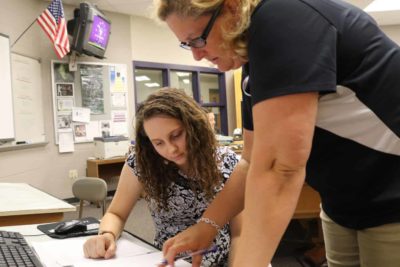

UNC System President Margaret Spellings delivered an important speech a few days ago — important for what she had to say about unsettling discontent in this contentious political era and for what she signaled about strengthening the university’s engagement with elementary and secondary schools in North Carolina.
Speaking to a NC Chamber gathering in Durham, Spellings cited “troubling polling data about higher education.” She found especially troubling a recent Pew Research finding that 58 percent of Republicans think higher education is bad for the country. The words appear italicized in her text.
“Here in the United States, home of the world’s finest universities and the birthplace of public higher education, a majority in one of our two political parties thinks colleges and universities are a net negative to the nation,” said Spellings, who did not mention but her audience surely knew that she is career-long Republican.
Spellings pushed back against false choices and constructs. The debate between liberal arts and job-oriented education is settled, she said; in today’s world, you need both. It is a “bogus narrative,’’ she said, that the private sector is stymied by an overbearing public sector. Then for emphasis, she added:
“You all know the value of our state’s schools, community colleges, and universities. You attended them, you hire our graduates, you expect your children and grandchildren to benefit from higher education….We have to strengthen these incredible valuable public resources, because an erosion of faith in our shared institutions hurts us all.”
Before becoming president of the UNC system, Spellings served as George W. Bush’s education adviser when he was governor of Texas, then served as a policy aide in the Bush White House, then U.S. Secretary of Education. She is conversant, therefore, in the P-16 concept, education-speak for forging a continuum from pre-school through community college or university completion. She reported North Carolina is one of only 10 states without a “shared post-secondary attainment goal.”
Spellings plans to convene a commission of civic and nonprofit leaders, business executives, and educators to identify obstacles, provide indicators of success, highlight key grade-to-grade and school-to-college transitions in the educational pipeline, and recommend actions to create a “P-16 pathway’’ through the state’s educational institutions that are governed separately.
When it is launched — likely in October — this P-16 commission will join other panels working on aspects of the future of schools in North Carolina. Gov. Roy Cooper signed an executive order creating a Governor’s Commission on Access to a Sound Basic Education. Republican lawmakers have a task force looking at a major change to how funds are allocated to schools.
Andrew Kelly, senior vice president for strategy and policy, pointed to the UNC system’s strategic plan, which emphasizes efforts to improve access and graduate more rural and low-income students. Part of the access strategy is to work to elevate academic achievement as students move through the educational pipeline. “Access is only good for students who can quality for admission,” said Kelly. The university has a role, he said, as a “thought leader’’ in developing a long-range vision.
Already, of course, public universities exert powerful influences on public elementary and secondary schools. The UNC system is the major supplier of new teachers. Scholars in education, early childhood, and public policy produce research that influences teaching methods and schools’ practices. In responding to a mandate from the General Assembly, the UNC system is developing four laboratory schools. In addition, the universities’ admission standards contribute to shaping high school curricula and the decisions of parents and students on what courses to take.
Now, Spellings has the UNC system poised for another means to shape the state’s educational landscape. “The truth is that we don’t have a continuum,’’ she said. “The failure to build unified pathways — to make education beyond high school the default option — is holding back our students and holding back our state.”


